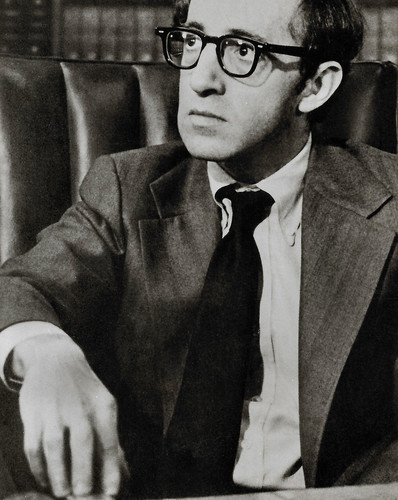
East-German postcard by Progress Film-Verleih, Berlin, no. 71/78. Woody Allen in The Front (Martin Ritt, 1976).
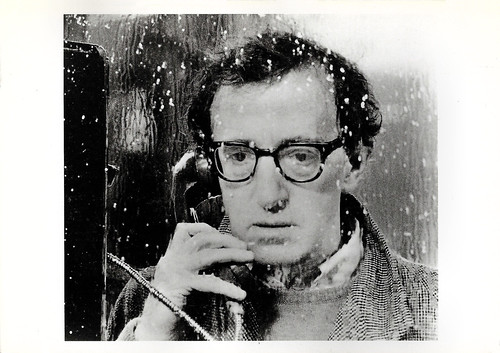
French postcard in the Collection Magie Noire by Editions Hazan, Paris, no. 6273, 1991. Woody Allen in Hannah and Her Sisters (Woody Allen, 1986).
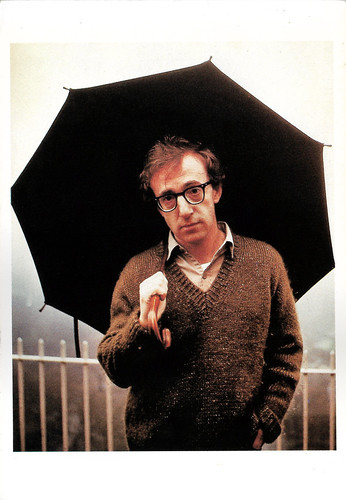
French postcard by Humour a la Carte, Paris, no. ST-146. (Woody Allen is mistakenly written as Woody Halen at the backside).
Spies searching for the secret recipe for egg salad
Woody Allen was born in 1935, as Allan Stewart Konigsberg in Brooklyn, NY. He was the son of Martin Konigsberg and Nettie Konigsberg and has one younger sister, film producer Letty Aronson. The family lived in Flatbush, a Jewish neighbourhood. As a young boy, Allan became intrigued with magic tricks and playing the clarinet, two hobbies that he continues today.
Allan broke into show business at 15 years when he started writing jokes for a local paper, receiving $200 a week. Thanks to his talent and the connections he made, he was soon allowed to work for entertainment stars like Sid Caesar. He started to use the stage name 'Woody Allen' for which he borrowed 'Woody' from the clarinettist Woody Herman. At 17, he changed his civil name to Heywood Allen. He chose the first name 'Heywood' in reference to jazz pianist Eddie Heywood.
In 1956, Allen married the seventeen-year-old philosophy student Harlene Rosen. The young couple moved to Manhattan. In this period, Woody rose from gag supplier to scriptwriter for TV shows such as The Ed Sullivan Show and The Tonight Show. In 1957, nominated for an Emmy, he stepped out of the shadow of his clients and in front of the camera for the first time.
Despite his lucrative job, Allen took a Communications Arts Course at New York University - for the sake of his parents - but was hardly ever seen there. A formative event of his student days was probably that, following the advice of his dean, he went to see a psychoanalyst. His marriage to Harlene fell apart. The couple separated and the marriage ended in divorce in 1962. Until Harlene was the main subject of his gags until 1969 when she sued him for two million dollars.
Woody felt that his jokes for the TV shows were being wasted. His agents, Charles Joffe and Jack Rollins convinced him to start doing stand-up and telling his own jokes. Reluctantly he agreed and, although he initially performed with such fear of the audience that he would cover his ears when they applauded his jokes, he eventually became very successful at stand-up. With his unusual intellectual style and made-up stories from his private life, he was well on his way to becoming a national celebrity.
Allen was approached to write a script for Warren Beatty to star in What's New Pussycat (Clive Donner, 1965). He would also have a moderate role as a character in the film. During production, Woody gave himself more and better lines and left Beatty with less compelling dialogue. Beatty inevitably quit the project and was replaced by Peter Sellers, who demanded all the best lines and more screen time. It was from this experience that Allen realised that he could not work on a film without complete control over its production.
Woody took his first steps in the new medium using the same formula that had brought him such great success on the stage. His theoretical directorial debut was What's Up, Tiger Lily? (Senkichi Taniguchi, Woody Allen, 1966). This was a Japanese spy flick that he dubbed over with his own comedic dialogue about spies searching for the secret recipe for egg salad. His real directorial debut came the next year with the mockumentary Take the Money and Run (Woody Allen, 1969). In the next decades, he wrote, directed and, more often than not, starred in about a film a year. Simultaneously, he wrote more than a dozen plays and several comedy books.
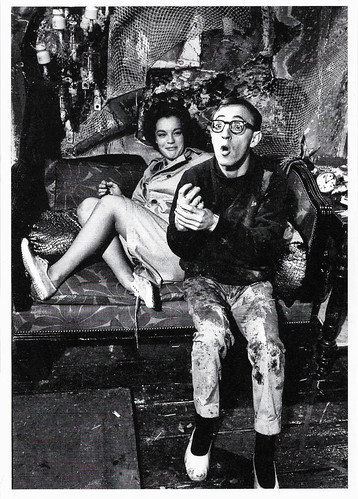
Swiss-German postcard by News Productions / artconcept, no. 0103-6100284. Photo: Larry Shaw. Woody Allen and Romy Schneider in What's New Pussycat (Clive Donner, 1965).

Swiss-German-British postcard by News Productions, Baulmes / Filmwelt Berlin, Bakede / News Productions, Stroud, no. 56570 Photo: Larry Shaw. Caption: Woody Allen at the Crazy Horse, Paris, 1965.

British postcard by Brent Walker Film Distributors LTD. Poster for What's Up Tiger Lily? (Woody Allen, Senkichi Taniguchi, 1966). In Woody Allen's directorial debut, he took the Japanese spy film Kokusai himitsu keisatsu: Kagi no kagi/International Secret Police: Key of Keys (Senkichi Taniguchi, 1965), the fourth instalment of five films in the Kokusai himitsu keisatsu series, and completely changed the tone of the film into a comedy about the search for the world's best egg salad recipe.
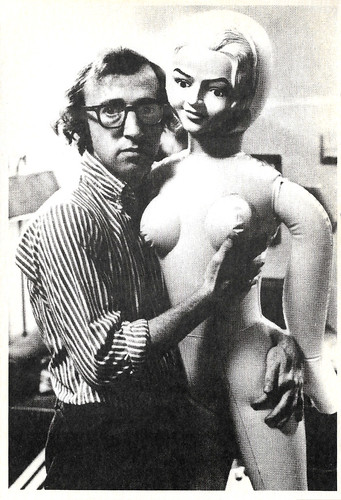
French postcard by Editions cinema, no. 115. Woody Allen in Bananas (Woody Allen, 1971).
Many transitions in his films throughout the years
Woody Allen met the young actress Louise Lasser. They married in 1966, but in 1971 the marriage was divorced again. However, Lasser played big roles in such films as Bananas (1971) and Everything You Always Wanted to Know About Sex* (*But Were Afraid to Ask) (1972), a hilarious satire of the enlightenment films of the 1960s. These films and also the Science Fiction comedy Sleeper (1973) and Love and Death (1975) are seen as the 'early, funny ones' in Allen's career as a film director and are characterised above all by their combination of absurd linguistic and visual wit.
Allen has made many transitions in his films throughout the years. In 1972, he starred in Play It Again, Sam which he also wrote, based on his own 1969 Broadway play of the same name, but which was directed by Herbert Ross. Allen played a recently divorced film critic, Allan Felix, who identifies with the film Casablanca (Michael Curtiz, 1942) and the character Rick Blaine as played by Humphrey Bogart. He is urged to begin dating again by his best friend Dick but falls in love with Dick's wife, played by Diane Keaton, who became also in real life his partner.
From the mid-1970s onwards, the humorous element in his films was pushed back in favour of a more dramatically ambitious plot. Diane Keaton often acted as a partner and female lead in the acclaimed hits Annie Hall (1977), and Manhattan (1979). The last part of this so-called New York trilogy, Stardust Memories (1980), borrows heavily from Federico Fellini's 8½ (1963). Set in New York, it is about a filmmaker and his great contempt for his audience. Like its two predecessors, Stardust Memories is clearly autobiographical in tone, even though Allen later claimed that there were no parallels between the protagonist of his film and himself.
At the end of the decade, Mia Farrow entered his life, and from then on, she appeared in very different roles in his 'Bergmanesque' dramas including Interiors (1978), September (1987) and Another Woman (1988). Some critics accused Allen of only wanting to copy Ingmar Bergman but they overlooked Allen's independent approach. In Crimes and Misdemeanors (1989), he depicts a deadly murder mystery but does not avoid occasional comedic elements. This film was Allen's first collaboration with Bergman cinematographer Sven Nykvist. Allen's comedies became tragicomedies with more elaborate stories, often taking place in several levels of action and reality such as The Purple Rose of Cairo (1985). With Hannah and Her Sisters (1986), Allen once again achieved great success, both commercially and with the critics. The film won three Oscars and the one for best screenplay went to Woody Allen.
His A Midsummer Night's Sex Comedy (1982) was influenced by William Shakespeare's 'A Midsummer Night's Dream' and its amorous entanglements. Zelig (1983) is a satire about a person who, chameleon-like, constantly adapts to his environment, and becomes a Hasidic Jew among Hasidic Jews and a Nazi among Nazis. In this film, which is seemingly staged like a documentary with clips from newsreels, Allen portrays a man whose impersonality causes him to drift through the ages. In Broadway Danny Rose (1984), Allen tells the story of a New York artist agent who gets lost in mafia circles and portrays the milieu of standup comedians that was the basis for his own career.
The film Husbands and Wives (1992) marked the end of the professional collaboration between Allen and Mia Farrow. Their relationship fell apart when Farrow discovered nude photographs taken by Allen in 1992 of her 21-year-old adopted daughter Soon-Yi Previn and Allen subsequently admitted to the relationship with her. A nasty court battle over custody of the remaining children followed. Farrow publicly accused Allen of sexually abusing their adopted daughter, the seven-year-old Dylan Farrow. The allegation gained substantial media attention, but Allen was never charged or prosecuted, and he vehemently denied the allegation. Allen married Previn in 1997, and they adopted two children.
During the 1990s, Allen gradually found a new style in films. His tragicomedies were replaced by films that again seem lighter and more upbeat. Examples are Bullets Over Broadway (1994) with an Oscar-winning Dianne Wiest, Mighty Aphrodite (1995) for which Mira Sorvino won an Oscar, and Deconstructing Harry (1997). In the new century, he returned after some lesser films with his acclaimed thriller Match Point (2005). Many critics spoke of a new, reinvigorated Allen. It was his first film set and produced exclusively in London and thus the first film of his 'European phase'. His next two films, the crime comedy Scoop (2006) and the drama Cassandra's Dream (2007) were also set in London. In the latter, Colin Farrell and Ewan McGregor played two brothers in London's working-class milieu who drift into crime. The comedy Vicky Cristina Barcelona (2008) was set in Spain and starred Scarlett Johansson, Javier Bardem and Penélope Cruz, who won an Oscar for Best Actress in a Supporting Role for her performance.
The romantic comedy Midnight in Paris (2011) about a successful US screenwriter (Owen Wilson) who is transported back to 1920s Paris opened the 64th Cannes Film Festival. The film was a huge success both at the box office and with critics. Allen received an Oscar and a Golden Globe for the screenplay in 2012. In addition, Midnight in Paris received Oscar nominations in the categories Best Picture, Best Director and Best Production Design. Although his stories and style have changed over the years, Woody Allen is regarded as one of the best filmmakers of our time because of his views on art and his mastery of filmmaking. In the past ten years, films such as To Rome with Love (2012), Blue Jasmine (2013) and Café Society (2016) followed. At the time of writing this post, Allen is in Paris shooting his yet-untitled new film. It will be his 50th.
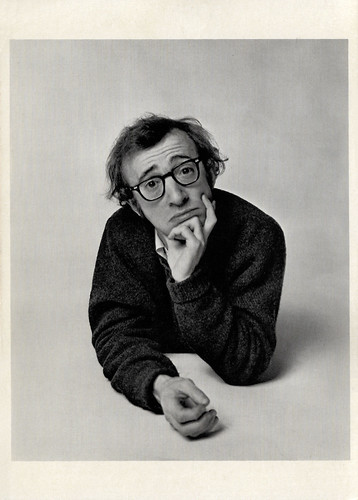
American postcard by Fotofolio, New York, N.Y. Photo: Philippe Halsman, 1969.
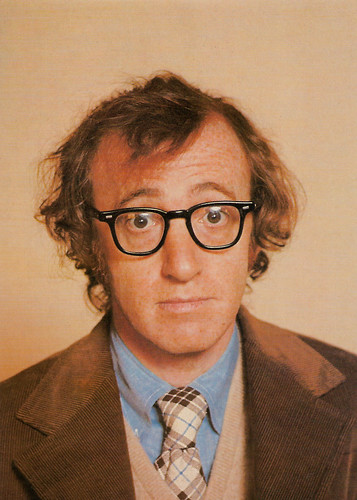
British postcard by Star-Graphics, London, no. S 120.

Dutch collectors card. Woody Allen in A Midsummer Night's Sex Comedy (Woody Allen, 1982).
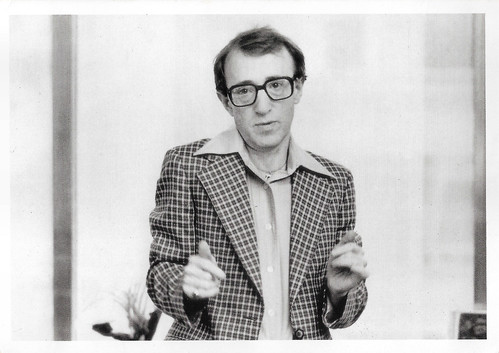
French postcard in the Collection "Portraits de Cinema" (6e série), no. 10, by Editions Admira, Aix-en Provence, no. PHN 862, 1990. Photo: Snap Photo / Cosmos. Woody Allen in Broadway Danny Rose (Woody Allen, 1984).
Sources: David McCollum and Michael Castrignano (IMDb), Wikipedia (German, English and Dutch), and IMDb.
No comments:
Post a Comment